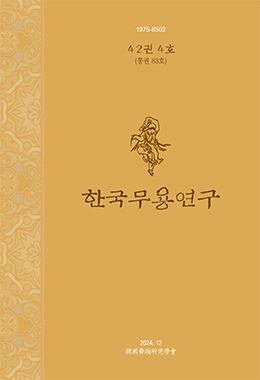연구목적: 본 연구는 Judith Butler의 젠더 수행성 이론을 바탕으로 피나 바우쉬, 마크모리스, 아크람 칸의 무용 작품을 분석하여, 신체적 움직임이 젠더 고정관념을 해체하고 새로운 정체성을 탐구하는 방식을 규명하고자 한다. 이를 통해 무용이 사회적 규범과 내면적 갈등을 반영하는 강력한 예술적 매체임을 밝히고자 한다. 연구방법: 각 작품에서 신체적 움직임, 무대 연출, 조명, 의상 등 시각적 요소들이 젠더 경계를 넘어서는 예술적 실천으로 작용하는 방식을 심층적으로 분석하였다. Butler의 젠더 수행성개념을 기반으로 작품에서 젠더 역할이 해체되고 재구성되는 과정을 중점적으로 살펴보았다. 연구결과: 피나 바우쉬의 Cafe Muller는 신체적 억압과 반복적 동작을 통해 전통적 젠더 역할을 해체하고, 마크 모리스의 Dido and Aeneas는 성별 전환을 통해 젠더 구분을 넘어 보편적 감정을 표현한다. 아크람 칸의 Until the Lions는 성별을 초월한 복합적 정체성을 시각화하여 젠더 이분법을 넘어서는 서사를 제시한다. 결론: 본 연구는 무용이 젠더와 정체성의 고정관념을 해체하고 신체적 자유를 통해 사회적 규범을 재구성하는 강력한 예술적 도구임을 규명하였다. 무용은 성별을 초월한 신체적자유로 젠더를 유동적이고 복합적인 개념으로 탐구할 가능성을 제시하며, 예술이 성소수자 인권과 젠더 다양성에 대한 사회적 수용을 촉진하고 더 포용적인 사회로 나아가는 데 중요한 기여를 할 수 있음을 확인하였다.
Purpose: This study analyzes contemporary dance works by Pina Bausch, Mark Morris, and Akram Khan through Judith Butler’s theory of gender performativity, aiming to clarify how bodily movement deconstructs gender stereotypes and expl ores new identities. The research highlights dance as a powerful medium that reflects societal norms and internal conflicts. Methods: Each work is analyzed in depth, focusing on how physical movement, stage direction, lighting, and costumes operate as artistic practices that transcend gender boundaries. The study emphasizes Butler’s concept of gender performativity, examining the process of deconstructing and reconstructing gender roles within each piece. Result: In Cafe Muller by Pina Bausch, traditional gender roles are dismantled through physical restraint and repetitive motions. Mark Morris’s Dido and Aeneas expresses universal emotions that transcend gender through role reversals, while Akram Khan’s Until the Lions visualizes complex identities that move beyond binary gender, presenting a narrative that challenges conventional gender constructs. Conclusion: This study reveals contemporary dance as a powerful artistic tool for challenging fixed notions of gender and identity, reconstructing societal norms through bodily freedom. It suggests that dance, by embracing fluid and complex concepts of gender, can foster societal acceptance of LGBTQ rights and gender diversity, contributing to a more inclusive society.




